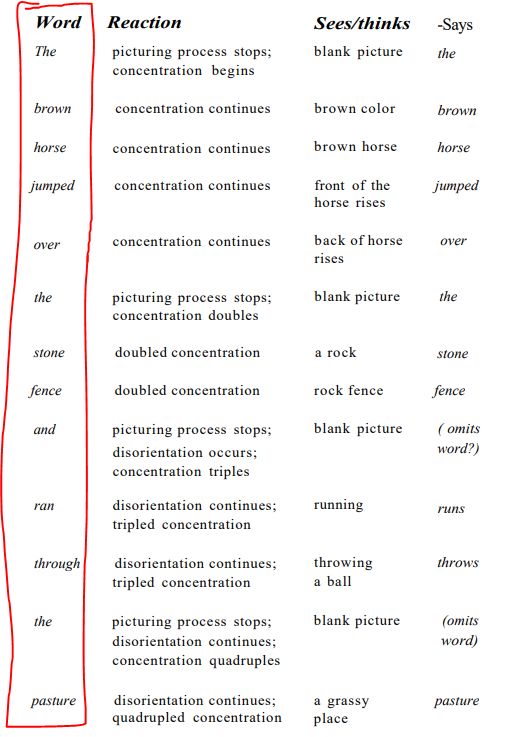Am I Dyslexic? What are the common sign’s someone is Dyslexic? Complete the dyslexia test below and receive your results with everything you need to know. Plus get a free guide on the most efficient way to arrange your time as a dyslexic adult.
The word comes from the Greek meaning of “difficulty with words”. Modern research has shown Dyslexia is much more than that.
Dyslexia is a neurological based learning anomaly, defined by difficulties with fluent word reading, literary accuracy, poor spelling and poor sensory and information abilities. Dyslexia impacts both spoken and/or written language. Other areas include cognitive processing speed, working memory, sequencing, auditory and visual processing and motor skills. (i.e. dialing a telephone and making mistakes).
Adults with Dyslexia think differently from others, and there are both advantages and disadvantages to that. Generally, adults with dyslexia have a difficult time reading, spelling, recalling information, recalling names, objects and dates.
Dyslexic minds use different neural-pathways to learn, view, hear, smell, feel, and receive information, and often non-dyslexic people can misunderstand these differences. Ask someone how often they are misunderstood – if it’s high, then there’s a good chance that person could be dyslexic.
Despite these challenges, dyslexics still make up some of the best minds, leaders and entrepreneurs on the planet.
Dyslexia occurs on a scale from mild to severe. They’re all slightly different to a certain extent.
A cure for Dyslexia is similar to asking if there’s a cure for Harry Potter’s magic. In all seriousness, there is no cure for Dyslexia. It is critical for dyslexic adults to accept and use it.
Once outside the traditional school system, if a dyslexic adult is supported by a positive community, proven process and focused relevant education, a Dyslexic can be a powerful contributor to society. Did you know 8 out of 10 prison inmates are dyslexic? Why? Lack of support and direction.
Adults with Dyslexia will have difficulty with all forms of language. If you found it difficult to learn another language, It could be attributed to Dyslexia. Dyslexics don’t have an issue with comprehension, in fact, the opposite. Those with Dyslexia often possess higher level language skills to support their reading of connected text (stories) as a supplementary mechanism to compensate for their difficulty with single word reading.
The underlying issue is that dyslexics struggle to convert letters to their correct sound and convert sounds to their correct written symbol. In other words they have challenges in spelling correctly and forming full written sentences.
Although dyslexics struggle with spelling, visual cues, memory and numbers, they often conversely excel in using creative pathways through reading, counting and memory to solve problems and enhance creativity. This makes them extremely valuable as business leaders and entrepreneurs.
Adults with Dyslexia have the ability to reduce the noise and hit the root of the situation, business problem, customer problem etc. What others can often interprets misunderstanding a situation is in fact the opposite.
From a business working perspective, co-vid has been an exceptional time for adults with dyslexia. The internet has removed many barriers, distractions and fears from in-person interactions that dyslexic associate with their school years. To get the most out of professional dyslexics. Take note of the following:
Adults with dyslexia hold a sea of strengths outside of their difficulties with spoken and written language. Often creative, have good analytic skills, the ability to see through problems, not at problems and think outside the square to name a few.
Before you interview anyone with Dyslexia. Here are some things you need to know.
When training dyslexics, ensure that in-house courses have a Good Practice policy in relation to dyslexic trainees. For example, trainers should:
If there are multiple people who identify as neurodivergent in the workplace, it is important to encourage and provide resources for peer-support systems to be established.
Many people find it more beneficial to speak with neurodivergent peers, rather than HR professionals, line managers, or colleagues, who do not experience the world in the same way.
It can be helpful for staff to have a platform to share strategies and experiences with others, as well as a neurodiversity network in the workplace. E.g. an intranet information hub, or even the encouragement to attend awareness-raising training.
A simple sentence like the one below would be easy to read for anyone who thinks with the sounds of words. But for a Dyslexic who constructs mental pictures of the scene as each word is read, the process is more difficult.
“the brown horse jumped over the stone fence and ran through the pasture.”

If you ask a Dyslexic to read out loud and answer what this sentence means on the fly. It’ll be perceived that he/she doesn’t understand any of what we just read. At this point, us dyslexics don’t care if we didn’t understand it. We’re just thankful that we survived the ordeal of reading out loud.
There are three main types of dyslexia. Most people have all three types, usually at differing levels. These include:
Often, meetings can make the most qualified and experienced dyslexic look ignorant and clueless.
This is why being open and transparent about your dyslexia is critical in the workplace. Your colleagues need to understand how you think and operate.
Dyslexic adults are great explorers of culture, people and information. This is the reason so many people with dyslexia become CEOs and CMOs. Dyslexia and strategic, innovative thinking go hand-in-hand.
© 2024 DyslexiaConsulting.com. All rights reserved. Privacy & Terms
Dont Leave Empy Handed…
Take This With You!

Free In-Depth Guide On You As a Dyslexic Can Easily Run a 6+ figure Consulting Business